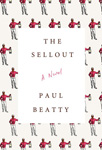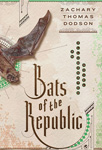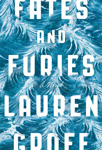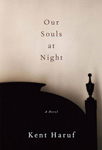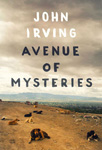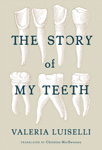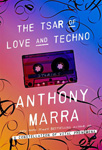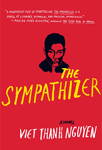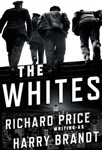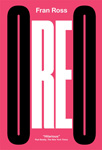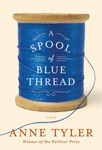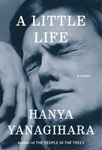by Chris Adrian and Eli Horowitz
Buy it at Powell’s »Jeff VanderMeer: I had never heard of Paul Beatty or Anthony Marra before this tournament—and when the books arrived I aimed to keep it that way. My wife Ann hid the dust jackets and I resisted reading any reviews, profiles, or interviews.
I dipped into Marra’s The Tsar of Love and Techno first and read a few pages of the first story, “The Leopard,” which seemed promising—if familiar, after two decades of reading a lot of Russian literature and history. Then I switched over to Beatty’s The Sellout, and the top of my head blew off. My wife can attest that I looked like I’d lost my mind, muttering and hollering “Holy shit!”, chuckling, giggling, sucking in my breath, and slapping my knee in admiration. Reading the prologue to this satirical novel—about a man raised on a farm in “the hood” in Los Angeles who, in trying to game a racist system, is brought before the Supreme Court—was revelatory and one of the great reading experiences of my life.
I meant to go back to The Tsar after Beatty’s prologue, but instead I devoured The Sellout. I kept wondering, “How can he keep juggling the equivalent of three chainsaws, a small child, a flamethrower, and an oiled pig?!” And yet he did. Beatty’s genius is multidimensional as he uses an often scathing sense of humor—from the conceptual to slapstick—to expose the ironies, inequities, contradictions, and absurdities of life in the United States from a non-white perspective. (That absurdism echoes certain traditions in Russian literature.) He shows the narrator’s early life in various complex iterations of twisted kindness and cruelty; repurposes racial slurs; skewers both liberals and conservatives; sends up centuries of racial oppression; exposes rifts in the African-American community; and provides a remarkably detailed and interesting description of Los Angeles. Many comic novels would be successful based on those elements alone, but Beatty also creates a convincing and often sympathetic narrator who isn’t just a delivery system for jokes, gives readers an affectionate portrayal of life on a “just-this-side-of-lunar-surface” urban farm, and provides a plot that delivers genuine surprises.
Reading The Tsar of Love and Techno after The Sellout could have been a similarly transformative experience. “The Leopard,” about a conflicted Soviet-era censor who keeps his disgraced brother’s memory alive at great cost, displays a nice sense of restraint, invention, and danger. The writing is elegant. Still, the narrator’s statement that “You remain the hero of your own story even when you become the villain of someone else’s” seems added from a creative writing lecture. “I have become a violent act of reality inflicted upon the fiction of which we are both citizens,” the narrator writes later. There’s meta and then there’s meta.
Throughout the collection, Marra can’t always resist telling us how to read his stories. “Granddaughters” has its moments but employs a shorthand that compares unfavorably to Beatty’s use of summary in The Sellout. “The Grozny Tourist Bureau” features a lazy, coincidental plot in which a painting sale funds a character’s operation. Marra gives the narrator a backstory about a wife and child killed while running through a minefield. Should we feel sympathy for these imaginary people we know nothing about who have just been blown up in a sentence, or think of them as another convenience?
“A Prisoner of the Caucasus” is an ambitious sprawl about regional war, but suffers from the author’s unwillingness to commit to the truly tactile. The mercenaries Kolya and Danilo are captured by Chechens and imprisoned in body bags in a well. Once there, they might as well exist in the abstract space inhabited by the protagonist of Vladimir Nabokov’s Invitation to a Beheading. If Marra had spent even a couple of hours down a well—with or without body bag—he would have written this scene differently. Later, we find out Danilo has lied so often about being married to a school-age crush that he now believes it and even remembers the wedding. Due to the earlier vagueness, this revelation comes across, disastrously, as a writerly conceit—borrowed from Michael Chabon’s Wonder Boys—rather than as evidence of Danilo’s war trauma.
The way a painting and a mixtape connect the stories creates some frissons of recognition and delight, but these mentions also often seem too obvious. In the title novella, “The Tsar of Love and Techno,” some of the dialogue might as well be “REMEMBER THE MIXTAPE?!” When a wolf appears for no good reason near the end of an already overlong scene in “The Tsar,” the wolf was screaming to me “WOLVES WILL APPEAR IN THE NEXT STORY EITHER LITERALLY OR FIGURATIVELY.” (Cue: “Wolf of White Forest.”)
In Beatty’s The Sellout, a possible breaking point comes in the form of a hilarious but implausible chapter about sister cities. But by then the author had banked so much goodwill that I put the improbable down to narrator hyperbole. Besides, the chapter includes a great running gag about the “Lost City of White Male Privilege,” whose walls some believed “had been irreparably breached by hip-hop and Roberto Bolaño’s prose.”
Conversely, after I had finished the titular piece in Marra’s book, I must admit I’d run out of patience—mostly because I felt that the author was bludgeoning me with clunky versions of commercial plot and character conceits disguised as “literary.” By the time I was shot into outer space (for no particular reason) in “The End,” the whole enterprise had already devolved into a kind of muted sentimentality.
Despite its lack of cosmonauts, The Sellout seemed more universal in its observations about the human condition. Beatty’s novel also rewards rereading. The prose stings when it needs to, but is often roughly beautiful, like Beat poetry:
They’ll scour the plantations, the projects, and the Tudor suburban subdivision affirmative-action palaces, digging up backyards looking for remnants of the ghosts of discrimination past in the fossilized dice and domino bones, brush the dust off the petrified rights and writs buried in bound legal volumes, and pronounce me “unforeseen hip-hop generation precedent” …
If you took an electron microscope and examined Beatty’s paragraphs and sentences, you’d find they’re alive and complex on the subatomic level. By the last third, too, Beatty has wisely lowered the manic intensity of that prose while still giving the reader great descriptions of characters and settings. This decision helps make The Sellout’s conclusion deeper and more rewarding even when absurdism returns in full force.
For these reasons, I’ve chosen The Sellout to advance in the tournament.
Match Commentary
By Janet Potter & Michael Schaub
Janet: If you could see me right now, I’m twirling like Fräulein Maria in the Austrian Alps, face raised to the sun in ecstasy, because I love the Tournament of Books. I can’t speak for Mike, but I’m sure he’s doing something similar.
Michael: That’s exactly what I’m doing! I think the neighbors are about to call the police.
Janet: We are so happy to be here. Mike and I have been friends since the days I wrote for him at Bookslut when he was managing editor there. Now we collaborate on our web series The Book Report: Every two weeks we pour ourselves some drinks, talk about books over Skype, and then upload a video of that conversation to YouTube—if you’ve ever wanted book recommendations from two people who love presidential trivia, this is the show for you. But enough about us, let’s talk about finding humor in systematic oppression! Mike, what did you think of this match?
Michael: Janet, this was supposed to be so easy. As you know, The Sellout was my favorite book of the year, so I figured that The Tsar of Love and Techno, despite its awesome title, was in over its head. And then I read it, and I was blown away. It’s a beautiful linked short story collection, and I instantly fell in love with the author, until I did a Google search and discovered he’s six years younger than me, so now I’m all like “Oh, fuck you, Anthony Marra.” So what did you think? With its bizarre humor, tragedy, and setting in the former Soviet Union, it seems like total Janet-bait. Am I right?
Janet: You are correct, sir. As you know, I was a Russian major in college. I love the classics of 19th-century Russian lit, but a lot of the fiction coming out of contemporary Russia skews too surreal for me. So I’m always happy to find a Russian novel that captures that fatalism-tinged-with-dark-humor that sets my heart aflutter. So while I agree that, for the purposes of this tournament, The Sellout is a better book, I think VanderMeer dismisses Tsar too quickly. It didn’t make it to the semifinals by bribing the officials (Soviet Union joke). The book succeeds at what it sets out to do, which is to paint a portrait of 20th-century Russia through several interconnected lives over the span of a century, and it does so while being funny, weird, poignant, and even suspenseful.
Michael: I agree completely, though I think it could have used at least one “In Soviet Union, techno plays you” joke.
Janet: It struck me that these two books, while very different in structure and scope, are both interested in the ways their characters define morality and contentment while living under governments that are apathetic toward, or openly negligent of, their well-being. The Sellout does this by following one black man in a small California town over, what, a year or so? Tsar follows generations of characters across all of Russia. I think what VanderMeer says about The Sellout resembling Russian absurdism is very apt. Beatty and Marra’s characters have in common that they’ve stopped believing in right and wrong, and yet are trying to live lives of meaning. In a side-by-side matchup, I just think Tsar is outclassed by a more stinging, contemporary book. You and I have made fun of the book review cliché “brave and necessary” before, but the shoe fits for The Sellout.
Michael: I’m totally with you. The Sellout is the better book, but VanderMeer underrates Tsar to a weird degree. It’s a book you have to buy into, to an extent, and he clearly didn’t. “If Marra had spent even a couple of hours down a well—with or without body bag—he would have written this scene differently,” he writes. Yes! That is probably true! And if Paul Beatty had ever openly smoked marijuana in the Supreme Court, he would have written that scene differently. That is, to my mind, as meaningless as criticism gets.
Janet: As someone who openly smokes marijuana in the Supreme Court on the reg, I can tell you that Beatty gets it so right. How are you doing it, Beatty?!?!?
Michael: So yeah, VanderMeer’s dead wrong about Tsar, which I loved. But he gets it very right when it comes to The Sellout, and his observation that it resembles Russian absurdism is right on (although you know much more than I do about that). You’re absolutely correct when you say that the narrator of Beatty’s book has “stopped believing in right and wrong,” and that’s one of the things I loved about it. It takes an absurd novel, maybe, to depict an absurd society, and that’s clearly what contemporary America has become, even before the rise of Trump. And to write about institutionalized racism while still being extremely funny—how the hell did he get away with that? I mean, I’m awestruck.
Janet: The Sellout is a masterpiece, and I wouldn’t be surprised if it takes the tournament. I’m also glad Tsar has made it this far. Like you said, it’s a book you have to buy into, and VanderMeer obviously didn’t, and that’s his prerogative as a human and a tournament judge. I also scratched my head at his complaint about the scene in a well. Then again, the characters in VanderMeer’s Southern Reach trilogy spend a lot of time down a pit, so maybe he has high standards for Pit Lit. Again, his prerogative, and the subjective experience of reading fiction is what makes the tournament such a wild and wonderful beast.
Michael: OK, see, I didn’t know that about VanderMeer. My apologies to him. The closest I’ve ever come to being in a pit was the four years I spent in Catholic high school. And the closest I’ve ever come to openly smoking marijuana in the Supreme Court was secretly smoking marijuana in Catholic high school.
Janet: If I can say one more thing about Tsar before it’s erased by Soviet censors (lol get it?), I loved the ongoing theme of temporal things becoming permanent. That is, in the Soviet Union, things that should have been permanent (filial love, an engagement, a master’s painting) were destroyed, but things that should have been inconsequential (a Polaroid, a mixtape, a censor’s under-the-radar subversion) last for decades. I just thought it was a beautiful way to show what can survive in an oppressive society. So dasvidaniya, Tsar, you were a pleasure!
Michael: And pozdravleniya, The Sellout!
Kevin: [sound of door creaking open and shut; chairs shuffling] Hey, I am just sneaking in for a minute to say thank you to Michael and Janet (and to all our guest commentators this season) for doing such a wonderful job helping us out. After a dozen years of this, John and I can hear ourselves repeating, um, ourselves. I know all ToB readers have enjoyed the fresh perspectives you guys have offered this season.
And I want to give a special shout-out to Michael (and also Janet, actually). As I write this, Jessa Crispin has just announced that she is shutting down Bookslut. The Bookslut blog predated the ToB by several years and really changed literary discourse on the internet, primarily by setting an impossibly high bar for intelligent discussion. So thank you for this, and thank you for that.
It’s also my job to announce the final Zombie Round matchups. The Tsar of Love and Techno does not have enough votes to sneak into the top two, so Fates and Furies and A Little Life are officially this season’s decomposing antiheroes. Tomorrow A Little Life will take on The Turner House with literary biographer and Pulitzer Prize finalist Blake Bailey in the judge’s robes. Then on Wednesday, Fates and Furies will meet The Sellout with novelist and ToB veteran Celeste Ng officiating.
Janet and Mike discuss more about this judgment, and the rest of the tournament, in today’s special episode of The Book Report.

The official 2016 Tournament of Books T-Shirt by book designer Janet Hansen. Order yours!



